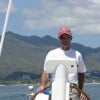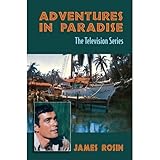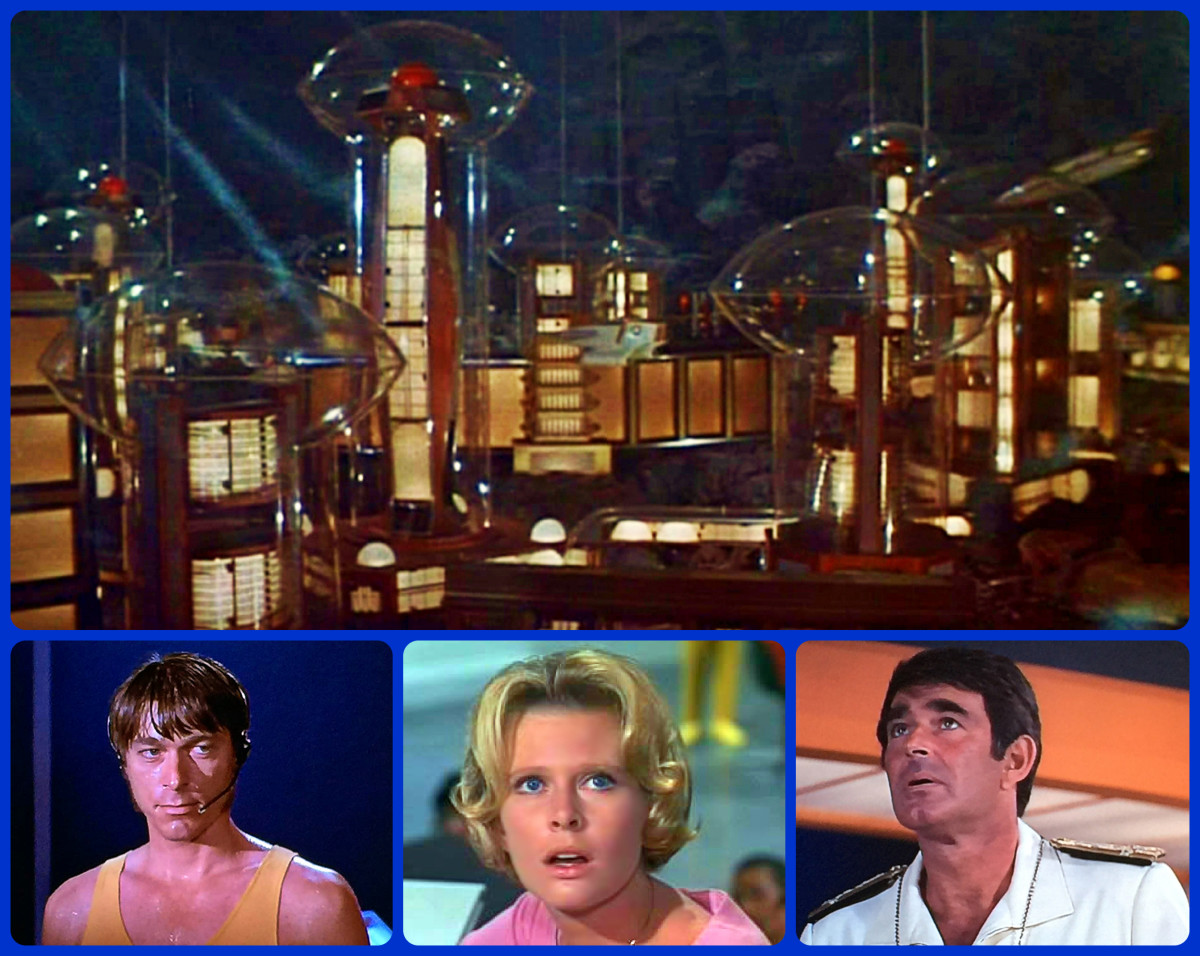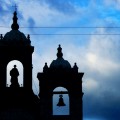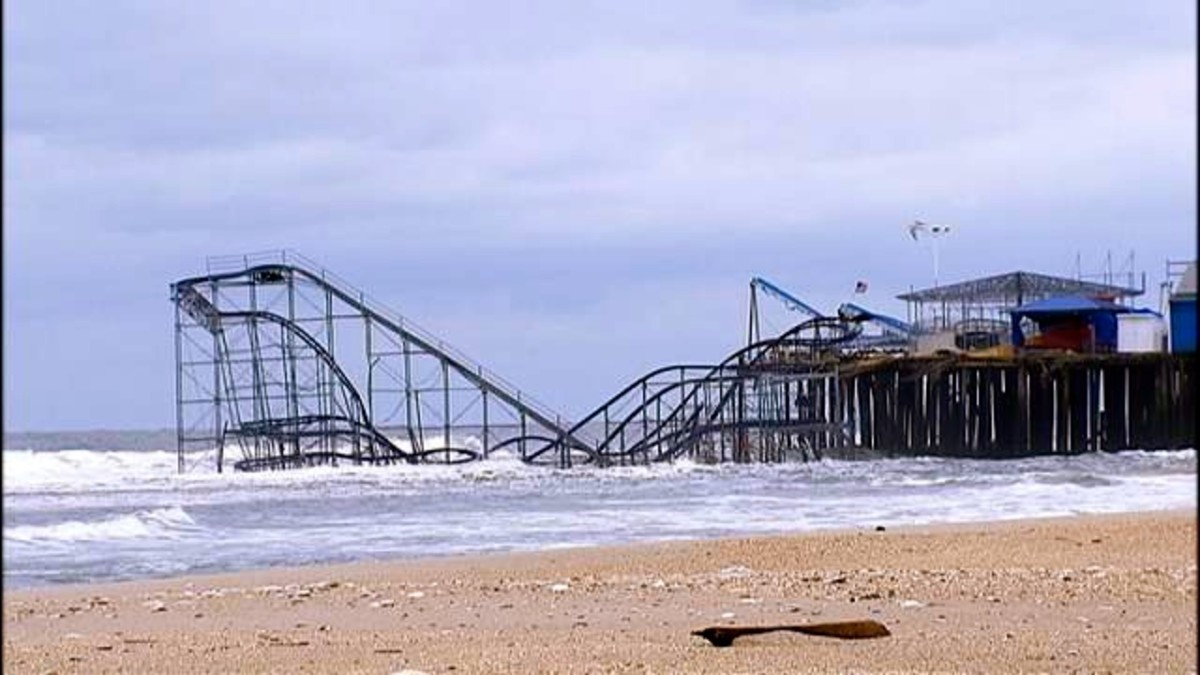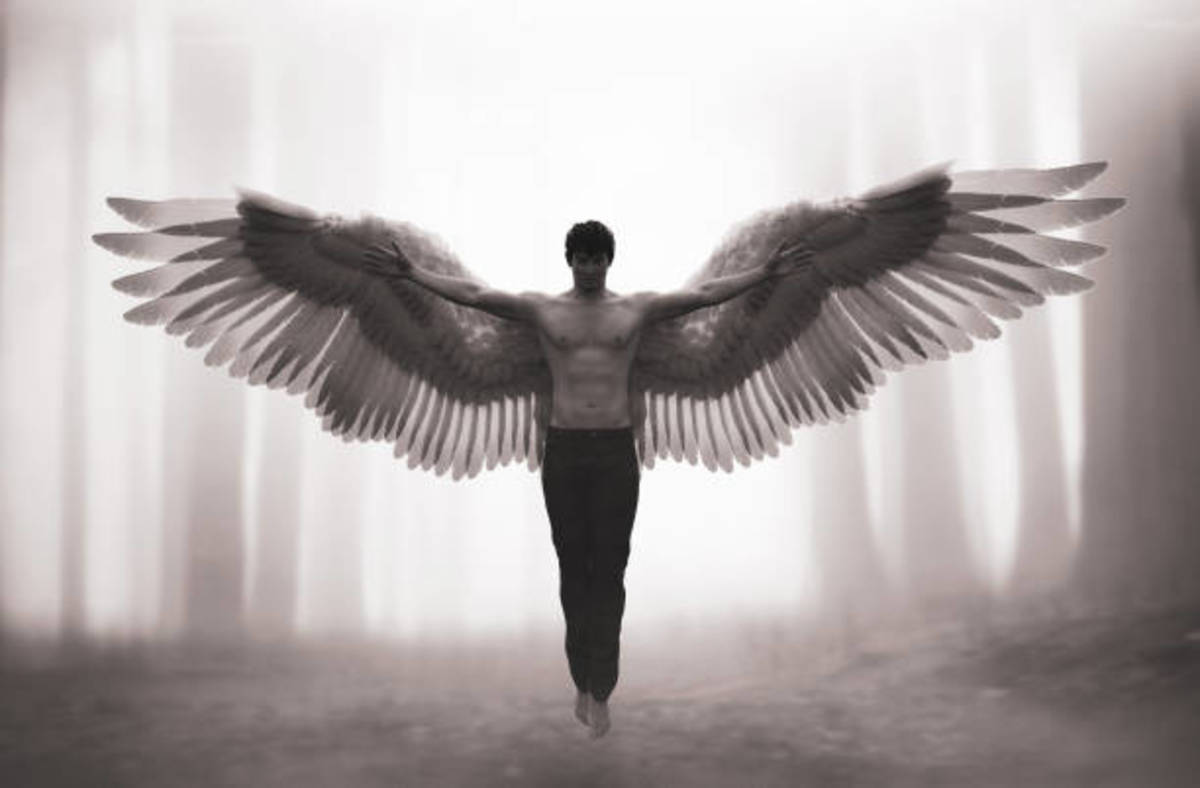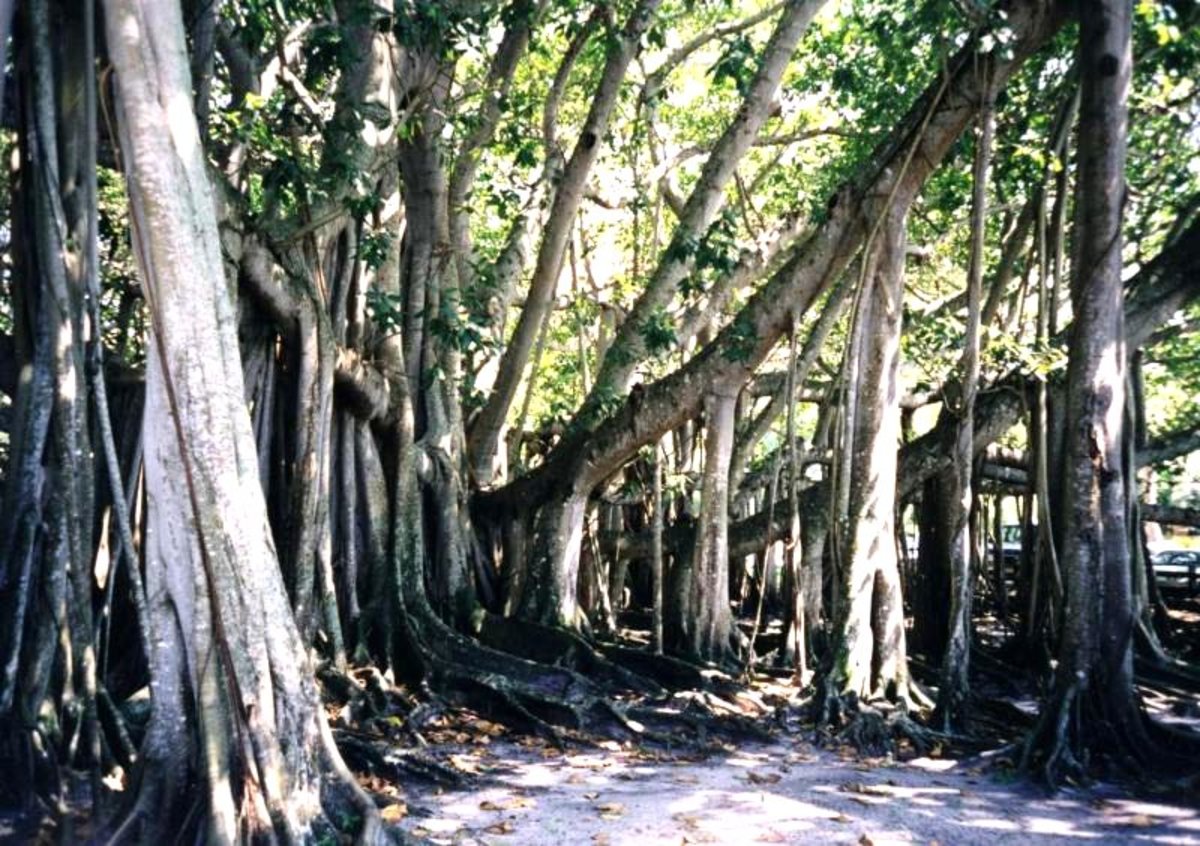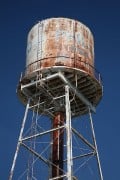- HubPages»
- Books, Literature, and Writing»
- Commercial & Creative Writing»
- Creative Writing
PARADISE
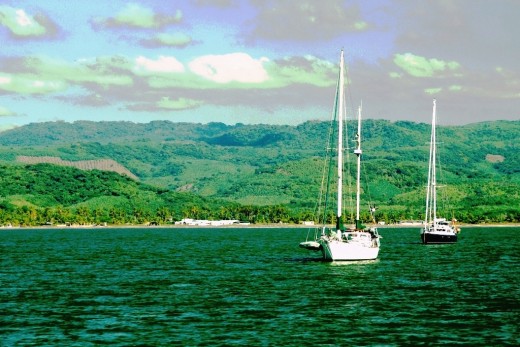
The bay south of San Blas was a grand expanse of peaceful sheltered blue-green water, oily smooth in the long morning light. It was framed on the north and west by gray sandy beaches that lay between outcroppings of black volcanic rock, and palm thatched palapas that formed a sort of abstract border stretching along and in front of deep green tropical foliage behind. It was even more beautiful after thirty-six hours of single-handed sailing my forty-six foot sloop Encounter through two days and nearly two nights across a turbulent gray sea from Cabo San Lucas. The sea had worn me down with its unceasing movement and monotony, but now I was risen again seeing the glistening tranquil bay for the first time in daylight after twelve hours of blissful sleep awakening to the gentle roll of the bay sea and warm sunshine. I had arrived in the bay the night before, in the pitch black darkness of a second night at sea on the verge of hallucinations demanding sleep. I could see the white crests of breakers on my port beam then, phosphorescing in the night, and dark silhouettes of the palms against the starlit sky along the shore, but the bay was black. The scattered village lights along the far shores, below the jagged ghosts of the mountains, like distant stars of varied colors, had no depth and seemed to float upon the water, and every shadow and void in the shimmering lights was an imagined rock. I dropped anchor in a state of confusion and uncertainty in twenty feet of ebony sea and surrendered to the night.
My awakening was nearly religious in its awesome calm and brightness. A golden benediction of warm light awakened my world as I drifted into consciousness. I was anchored off the southwest point of Matanchen Bay in a world transformed by my passage from the dry rusty gray of Baja to the lush green warmth of tropical mainland Mexico. It was as if, in the middle of the night as I slept, completely asleep, the sleep of exhaustion, I had been somehow transported to a new planet. The sky was a different blue, a vibrant pastel blue, the green hills seemed unreal, and morning dew clung to the topsides of my boat purging her of the salt and dust that had accumulated before. A school of small silver fish roiled the surface punctuating our subtle change in longitude and latitude as I looked out the side port of my boat at a new vision of paradise. The shoreline and the mountains to the east were densely verdant; the water a shimmering aqua green, more opaque than the waters of the Baja coast, and Encounter was reflected on its surface in an almost perfect mirror image that reached out from the bottom of her hull like a fold in a photograph. Yellow and red flowers highlighted the foliage languishing on the fringe of the beaches, and the feathery fronds of the coconut palms fluttered in the breeze; there was not a cactus in sight.
I climbed up the companionway and looked across the bay. There were six other sailboats anchored further inside the bay, rising and falling softly on the gentle ocean swell that undulated across the water like glistening green silk slowly ruffled in the wind. It was almost hot in the morning sun, but the air had a cool ocean fresh, tropical morning smell that stirred my senses. The morning air revived me as the warmth and humidity enveloped me like a down quilt in a winter storm. I made a pot of coffee then, and sat outside in the cockpit of the boat eating a bowl of fruit and soaking up the new world that I had been transported to. I watched the birds; pelicans glided across the gentle sea somehow never pumping their wings. Terns and boobies swooped and chattered above; one made several attempts to land on the radar dome mounted on the mast, but it was too smooth to serve as a firm perch. The hapless bird could not get a firm grip, and kept sliding off, and flapping its wings in empty air when the boat would roll just barely with the swell of the sea. More bait fish roiled the water chased from below, and a frigate bird dove for a morning feast.
After my breakfast I started the engine, raised the anchor and motored aimlessly into the center of the bay, past the other boats to see who I might know. I recognized some of them, but not intimately. I had seen them in other anchorages along Baja through the years and talked occasionally on the radio. I watched the bottom depth on my instruments and then anchored again, deeper inside the long curve of the beach in the lee of the west shore. The bay was very shallow and flat averaging about fifteen feet, and all of the boats were anchored in about the same depth, all about a half mile off shore, and so the shallowness did not concern me. With the anchor set again I drank the rest of the coffee and read, sitting in the cockpit in the sun soaking up the peace and quiet and the warmth. In between passages in my book I would glance up to survey the shore and the bay. The changing light of day cast new shadows and dimensions on the shore, the glimmer disappeared on the water with a subtle breeze, and the colors all grew darker in the afternoon light. A dinghy departed one of the boats nearby and motored off with two people on board toward the palapas, palms, and sandy shore of the bay. I watched to see where they landed, and then lost track in the blue sky and swaying palms.
Later, after a ham sandwich for lunch, I took the kayak off the deck of Encounter and paddled in along the southwest shore to explore the black rock point with its breaking waves of shattered white water that crashed ashore, and the tasseled groves of coconut palms that reminded me of the volcanic shores of Hawaii in the morning sun, and to peruse the palapas along the beach for signs of humanity. I had seen very few people on shore from the boat.
There were several houses set back and along the rock shore of the point, and I thought how different they appeared than the shanties and sheds of the fish camp villages along the coast of Baja that blended into the rock and desert of the shore. They were constructed from debris typically and were nearly invisible from the sea except for the sharp edges of the walls and roofs that shed unnatural shadows that exposed their existence. The Baja fishermen had little time or money for decoration or comfort.
This shore was not a fish camp, and the homes on the point at least were not the homes of poor fishermen. Behind a tall stand of palms there was one house painted bright green, and then down the beach a little further some others painted yellow and orange in the typical bright indigenous colors of the mainland people, and they were grouped together with their bright stucco walls like blank colored canvas beneath the palms. The green house had a satellite antennae perched on a corner of its palm thatched roof, and a new red pickup truck parked in the carport along its side. It appeared quite prosperous, and somehow out of place, too modern for this stretch of paradise. The yellow and orange buildings were part of a small resort it appeared, or perhaps a large family compound, and people were milling about in a central area of the grounds, set back from the gray sand beach. A young couple walked hand in hand along an inlet beach, scuffing the sand and talking. The only sound was an occasional bird call and the washing of the waves. That at least was the same as Baja; an almost ear ringing silence pervaded.
I paddled along the shore hoping to see a parrot perhaps or some other exotic creature, and looking for an easy beach landing to go ashore and feel my toes in the sand. This is much better country than Baja, I thought, though it wasn’t. I was just tired of the dessert and the monotony of browns and grays and rust colored land. There was a promise of something new and alive here within the verdant twisted foliage that drew me in, and I was very content in the moment.
I found a little backwater cove protected by the hook of a sandy shoal, and then braved the broken swell after studying its ebb and flow for a few minutes and came ashore a little south of an establishment labeled Neptune’s Restaurant on its wall that faced the sea. The dinghy that I had watched come in from the other boat earlier in the day was pulled up on the beach here, but the couple was nowhere in sight. Neptune’s building was a rather dank unfinished or maybe just unmaintained concrete structure painted a faded green with the owner’s, or some other’s living quarters on the second floor above the kitchen. You could tell that these were living quarters from the laundry hung outside along lines strung between the wall and the railings. The palapa on the ground floor had a thatched roof of grey palm fronds held up by twisted wooden beams and concrete posts over the restaurant patio at its side. It was not the type of roof you would want to sit under typically, certainly not built to code, but then nothing here fit the requirements of modern society most likely anyway, except that new Ford pickup and the satellite dish.
I dragged the kayak up the slope of the sand above the water’s high-tide line etched into the top of the beach, and then walked along the shore. The sand was gray and muddy still from a hurricane that had passed through a month before. The mud stuck to the bottom of my feet, but it was smooth, and cool and comforting to walk on after so long on the hard deck of my boat. The wind was blocked by the land, but the breeze still moved the tops of the palms. I could feel the sailor’s sway to the solid world as I walked along. The further I moved up the beach, away from the water, the more the air had a sweet and acrid smell that didn’t seem to fit. The gray dirt of the shore, and the shadows beneath the palms did not appear to hold the same promise as the picture postcard view from the bay. It was disconcerting, and I began to sense a certain incongruity.
I walked up through a small grove of palms with clumps of green coconuts hanging from their hearts that covered a patch of sandy dirt between two deserted palapas, and then exited along a rutted dirt road that ran behind more ramshackle palapas that lined the beachfront in both directions; they were deserted or at least unoccupied, but with their white plastic tables and chairs set up still for hoped-for patrons that had only started to trickle back on weekends probably since the hurricane had torn this shore asunder.
I emerged on a road and stood for a moment looking both directions, trying to decide which direction to take. One way led toward the point which I had already seen from the sea. There was a sort of scattered village in the other direction that lined the inland side of the road. The village was small and poor, too poor even for a small tienda or cobble-stones in the streets, and the road was sandy gravel, littered on its edges, and rutted from wear and neglect; still unrepaired since the storm. I walked slowly away from the point, up the gravel road between the rows of dilapidated buildings, and it was all the same. Weathered and overgrown brick, rock, and wood patchwork homes, with corrugated aluminum or palm thatched roofs were placed randomly on the inland side of the road. The rundown shelters faced the backs of the palapas, keeping watch through their dark open windows and doors. A few white-washed brick and plaster public-shower and bathroom buildings “reserved exclusively for patrons” of selected palapas were wedged in between the houses. I walked further beyond the buildings, and the road slithered away from the beach toward more dense vegetation and a swamp. It was all mangrove swamp with brown stagnant water on both sides of the dusty gravel road as it moved inland. I turned around and walked back into the village.
It was hot and humid in the afternoon, and there were no people outside. It may have been siesta time, I thought; I did not have a watch, but it seemed about the right time of day. I could hear a television set or radio sometimes inside a house as I passed the dark open doorways and windows. A group of the local men sat around a broken table on boxes and one broken chair, under a makeshift awning at the corner of one of the houses talking quietly and watching me as I walked by. There was a beer bottle sitting on the table, and a can of Pepsi sitting in front of one of the men. Coconut husks were smoldering in a corner behind them leaving a thin blue-gray haze of smoke hanging low in the air to keep the bugs away. I said “buenos tardes” as I ambled by, and they nodded without smiling, but not unfriendly.
The gray trunks of tall coconut palms lined the gravel road, and heavy, tangled jungle bush covered everything inland, between the houses and behind them, hiding the mangrove swamp that lay beyond. The foliage was green and thick and entangled with heavy vines and limbs that wound through it like varicose veins visible just beneath the surface of the skin of an aged denizen on the verge of their final days, the limbs holding it all up, and at the same time pressing down with the weight of the shade. Debris was still buried in the undergrowth, left there from the fury of the storm; paper, plastic, and plaster, broken furniture, and rotting fronds and other trash. The road seemed to divide and define two worlds separating the light and sea of the beach from the shadows and swamp of the inland.
There was no one at any of the palapas and they all appeared to be closed, except for Neptune’s Restaurant, which had a small hand-written sign propped up by rocks on the edge of the gravel parking lot that read “abierto / open”, if you looked closely. The sky was turning gray and heavy with a low woolen overcast as the afternoon progressed, and I could smell the clean threat of rain in the air. The clouds hovered over the bay and stacked up against the mountains to the east with intermittent curtains of virga sweeping through the air in the distance. I decided to have a beer at Neptune’s before heading back to my boat. I couldn’t help but feel that I was missing something. I was anxious to somehow uncover some piece of the local culture that appeared to have been washed away.
It was dark and quiet inside the palapa, dusky from the accumulation of shade and overcast. There was nobody about except an old woman who seemed to be in charge, but maybe not, idly sweeping the ground in front of the kitchen, and a local gringo, who may not have been a gringo. He glanced at me and nodded as I came inside but said nothing, sitting at a table having dinner it appeared, and drinking a glass of water that might have been tea with the house dog, a Golden Labrador Retriever, waiting patiently for a morsel of affection. The old woman was an Indian, dark brown, and wrinkled. She stooped at the waist as she swept with her dirty gray hair pulled back in an untidy bun at the back of her head. She wore an old gingham dress that fell below the calves of her knarled legs and dirty-pink, or faded red, plastic or rubber sandals. Her eyes were tired but they crinkled at the corners when she saw me enter.
“Hola”, I said: “Tienes una cerveza?” I asked for a beer. The old woman shrugged and pursed her lips in a sort of smile, nodding her head, and then ambled over to a small refrigerator behind the kitchen counter using her broom as a cane.
She opened the refrigerator door and then looked back at me over her shoulder, saying in Spanish that all she had was a half-bottle of Pacifico. I said “good / bueno”, and she opened the bottle and gave it to me wrapped in a napkin with a toothless smile. I wanted to ask for a lime, but didn’t. I got the impression that it was the last beer in the house.
I smiled back and said, “Gracias.”
“De nada, senor”, she replied, and nodded her head.
I asked her how much for the beer and she said “eight pesos”, and when I pulled out a twenty peso note she looked concerned and shook her head sadly and asked if I had change; saying she did not.
All that I had was seven pesos in smaller denomination coins, and I showed this to her and she said that would be “OK”, and shrugged again.
I paid her the seven pesos feeling somewhat guilty, but also content that I had finally come out on the better side of a transaction; perhaps I was in Paradise.
“Was the hurricane very bad?” I asked, in Spanish.
“Si senor. It was very bad”, she answered, with a resigned look on her face.
“Are the boats fishing now?” I asked. I had not seen any pangas on the shore, and that seemed un-natural.
“No senor, the boats are all gone. They are in the harbor now”
“Were many lost in the storm?”
“Si, once they were all here, and then they were gone. The hurricane came and they were all gone. Some went to the harbor, but many were lost”
“I am sorry,” I said.
“Yes, it is very bad. Only a few boats survived, but now there are no fish anyway. They are gone with the storm also.”
“The fish will come back I think.”
“Yes, and so will the boats soon.”
“Si. Buenos suerte”, I said, wishing good luck.
“Gracias, senor.”
The palapa was gloomy inside, and so I moved to the front where it was open and had more light. I sat down at a table on the edge of the concrete patio and looked out at the leaden sea, the ripple was gone, the water colored by the clouds above, and the dark green hills far across the bay with small appliqués of random agriculture cut out of the jungle, and flowing patches of bright sun-lit green splashed across the hills by drifting blue breaks torn in the overcast sky by the tips of the mountains that rose up behind. Along the shore on the far side of the bay below the rolling jungle hills there were houses lining the thin sandy beach with red tile roofs and glass in their windows that glinted in the scattered waning light. Several of them appeared quite large and opulent, and were surrounded by white and tan stucco walls that also caught the light and stood out starkly against the green of the hills and the sea. Occasionally a lone car or a large semi-truck would move along a thin line of highway that had not been apparent earlier in the day and ran along the base of the hills behind the beach-front houses.
The Golden Lab came over and nudged me for a pat and I stroked his head and back. He stood there welcoming my touch and smiled up lovingly at me the way only Labs seem to do, wagging his tale. He reminded me of a dog I had had as a boy, and pestered me more, enjoying the attention with that Labrador grin on his face. The gringo eating his dinner didn’t seem to mind; the dog was just flirting.
The day was sublime; I contemplated a second beer, and then remembered that there probably wasn’t any more, and drank the one I had slower. The old woman turned on a radio somewhere in the kitchen that played a happy mariachi tune, and then sat down at a table in a dark area of the room waiting for her customers to finish. It would have been nice to have someone to share this with, I thought. I felt a bit like the dog, looking around for someone to pet me.
I was thinking of Julie with her deep blue eyes and auburn hair. Everyone called her ‘Jewels’, and I had a vision of her walking out of the surf naked and wet with that wanton ‘I want my legs wrapped around you deep inside me’ smile on her face that she used on me whenever she could, her body tan and glistening in the sunlight that existed only in my dream at the moment. There were goose bumps on her golden, freckled skin; she always seemed to have goose bumps. Her un-tanned breasts like floating moons swayed with her walk, her nipples violet and erect, begging to be touched, and kissed. The globe of her belly glistened above the soft white patch of skin with its trim fury mound of wet curly shadow at the crux of her long tan legs. She moved with a happy constant naked confidence then, as we all had. We ran with a wild crowd then, in our youth, all of our gay friends drinking and carousing until all hours of the night and morning, making love whenever we wanted, to whomever we wanted; uncomplicated; working hard and playing even harder. Life in the City had been good in those days. “You fill me up”, I told Jewels once, but life was never empty. My God, we used to do lines of cocaine on the restaurant tables, waiting for our dinner or drinks, flirting with disaster, flirting with our mortality. It was illegal but not immoral; those were “recreational” drugs then. We drank to get silly, and then did a couple of lines as an antidote, so we could drink some more; like the Romans we were unconcerned with the future.
That was before the serious drug dealers commercialized the drugs with new chemicals to enhance their bottom line, and the government declared war to get their piece of the action; war is always good for the government and for business. Both sides have an excuse then for ripping off their constituents. They fucked it up for everyone else of course; the antidote became the poison. Some of us quit and moved on, others of us died from it. That was ‘BA’; ‘before AIDs’. Things really changed then. People started dying from having too much fun, from wanting to be loved, from being loved. Whatever happened to that world, I wondered, to Jewels, to that love, or maybe it was just lust, and not meant to last. Too many lovers, not enough love. And then she was gone.
The dog nudged me with his cold wet nose wanting my touch again. He had that Labrador grin on his long fury snout again, drooling at the black corners of his mouth. I looked to see if he was aroused. He wasn’t.
The air became heavy and still as the shadows of early evening descended around us. The overcast appeared to thin in the east. I thought the sun might return for a minute. The green hills grew brighter in the waning light from the west, reflected off the sea. And then they came.
Paradise always has its serpents; I should have known that they would appear. The jejennes materialized like little phantoms swirling round my eyes and ears, flashing tiny specks of light in the air, but solid none the less. The smoking coconut husks were a warning that I had ignored; the gringo dressed in long-sleeves and long pants; the mangrove swamp. I was caught totally unprepared; swarmed by the nasty “no-see-em’s” like bees to pollen, no, like vultures to carrion. They began picking at me hungrily, finding access to the more delicate areas of my skin before I even recognized their existence; they were in my ears, inside my shirt, flitting up my shorts, feasting at my ankles, around my neck, in the soft nether regions of my crotch.
‘Damn bugs’, I thought, slapping at empty air; ‘where did they come from?’ They seemingly had no affect on the dog, or the gringo somberly finishing his dinner, but he paused for a second with his fork suspended over his plate looking at me, and I could see that he was amused by my growing anxiety; vindication for my attention to his pet I suppose.
Perhaps they were not real, I hoped for a moment, a figment of the afternoon climate, the emerging dusk, a left-over hallucination from my past. I remembered a friend freaking out on a hit of ACID twenty years before, slapping at the air at phantoms in his head; that was one drug I had never done; hallucinations never appealed to me for some reason.
I tried to enjoy my beer, and to quietly ignore them, hopelessly, there was no reprieve from the buzzing round my head, the stinging tiny bites; they were real enough. It did little good to swat at them. I was unprepared, inadequately clothed, and they had recognized me as a virgin at a country club dance.
I finished my beer quickly, left the bottle on the table, and made a hasty retreat to the beach, trying not to look like I was running away from anything; crazy gringo. They followed me as I walked briskly to my kayak, struggling not to appear afflicted. The dog stared after me from the edge of the patio, his head cocked to one side, wondering, perhaps understanding. The nats encircled me like a cloud of dust as I crossed the beach, still buzzing and biting about my naked legs and arms, inflicting little painless-now wounds; they would itch mercilessly in an hour. This was not my first jejenne attack; God, I hated these little bugs. I was unarmed, and I knew the only possible victory would be a quick and total retreat.
The ocean break at the shore was small and regular; the water felt cool and comforting, and the nats that swarmed my legs were washed away and drowned as I waded into the low surf. I dragged the kayak out to knee deep water, and then quickly hopped aboard and paddled out through the swells. The jehennes seemed to break off then and dissipate in the new found breeze. I paddled out across the turbid gray-green water, and they were unable to sustain their attack in the wind as I pulled away from shore. I made my way back to Encounter, anchored far enough off the shore to lose them for good I hoped. I relaxed as I gained distance on them, but already I was itching with a hundred tiny stinging welts rising on my skin, around my neck, and hands, and ankles, inside my pants and shirt; another lesson etched into my psyche. The jejennes had exacted their price for another day in Paradise.
The low overcast thinned and scattered with the building evening breeze as the sun dipped below the clouded horizon. The sky was a kaleidoscope of blues and grays with an explosion of violet and orange sunset fire floating upon the western sea as the shadow of night descended from the mountains in the east. The jejennes were gone when I reached the haven of my boat, lost in the evening breeze that blew toward land. I stripped off my clothes and went swimming in the warm saline sea to soak away the venom. Lights along the shore flickered on with the night casting multicolored sparks upon the water again. There was a crescent moon suspended like a crystal bowl dancing though the clouds, floating lightly above the palms that brushed against the sky. It was a new moon following close behind the setting sun. The bay absorbed the night slipping into dark, the moon and stars reflected floating on its ebony surface. Encounter floated calmly on the sea. I could still imagine islands floating in the voids between the sparks of light. Whatever happened to Gardner McKay, I wondered.
